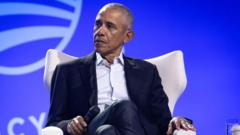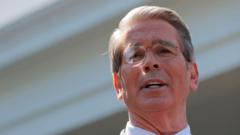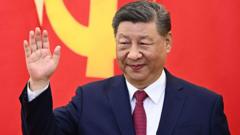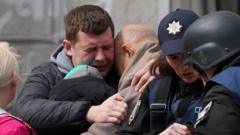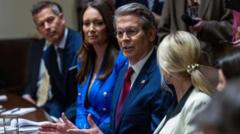During a meeting with U.S. President Trump, El Salvador's President Nayib Bukele declined to return Kilmar Armando Abrego Garcia, stating that doing so would be akin to smuggling a terrorist. This declaration comes amid a complicated legal battle surrounding the deportation case, which has reached the Supreme Court.
El Salvador’s President Refuses to Repatriate Wrongly Deported U.S. Citizen Amid Ongoing Legal Dispute

El Salvador’s President Refuses to Repatriate Wrongly Deported U.S. Citizen Amid Ongoing Legal Dispute
In a recent Oval Office meeting, El Salvador's President Nayib Bukele stood firm against the U.S. order to return Kilmar Armando Abrego Garcia, a deportee recently deemed wrongfully sent back to El Salvador.
El Salvador's President Nayib Bukele made a significant statement during his meeting with President Trump in the Oval Office, confirming that his government would not return Kilmar Armando Abrego Garcia, a U.S. citizen wrongly deported to El Salvador. Bukele's comments highlighted the contentious nature of the case, which he described as potentially comparable to smuggling a terrorist into the United States.
This deportation issue is set against a backdrop of ongoing legal disputes, with the U.S. Supreme Court indicating that the Trump administration had committed an "administrative error" when they ordered Abrego Garcia's deportation. Despite this, the Trump administration has resisted facilitating his return, demonstrating a complex interplay between legal obligations and political maneuvering.
Zolan Kanno-Youngs, a White House reporter, noted that Bukele's visit exemplifies how foreign leaders navigate their relations with the Trump administration, often by displaying support or alignment with Trump's policies.
In addition to this immigration conflict, the Trump administration continues to navigate a multifaceted trade war, threatening to impose tariffs on various imports and freezing grants to institutions like Harvard. As geopolitical tensions escalate, China's retaliatory measures pose additional risks to U.S. military projects, illustrating the broader implications of these policy decisions.
Overall, Bukele's refusal to repatriate Abrego Garcia highlights not only the legal complexities surrounding immigration but also the intricate relationships between countries and their leaders.
This deportation issue is set against a backdrop of ongoing legal disputes, with the U.S. Supreme Court indicating that the Trump administration had committed an "administrative error" when they ordered Abrego Garcia's deportation. Despite this, the Trump administration has resisted facilitating his return, demonstrating a complex interplay between legal obligations and political maneuvering.
Zolan Kanno-Youngs, a White House reporter, noted that Bukele's visit exemplifies how foreign leaders navigate their relations with the Trump administration, often by displaying support or alignment with Trump's policies.
In addition to this immigration conflict, the Trump administration continues to navigate a multifaceted trade war, threatening to impose tariffs on various imports and freezing grants to institutions like Harvard. As geopolitical tensions escalate, China's retaliatory measures pose additional risks to U.S. military projects, illustrating the broader implications of these policy decisions.
Overall, Bukele's refusal to repatriate Abrego Garcia highlights not only the legal complexities surrounding immigration but also the intricate relationships between countries and their leaders.




